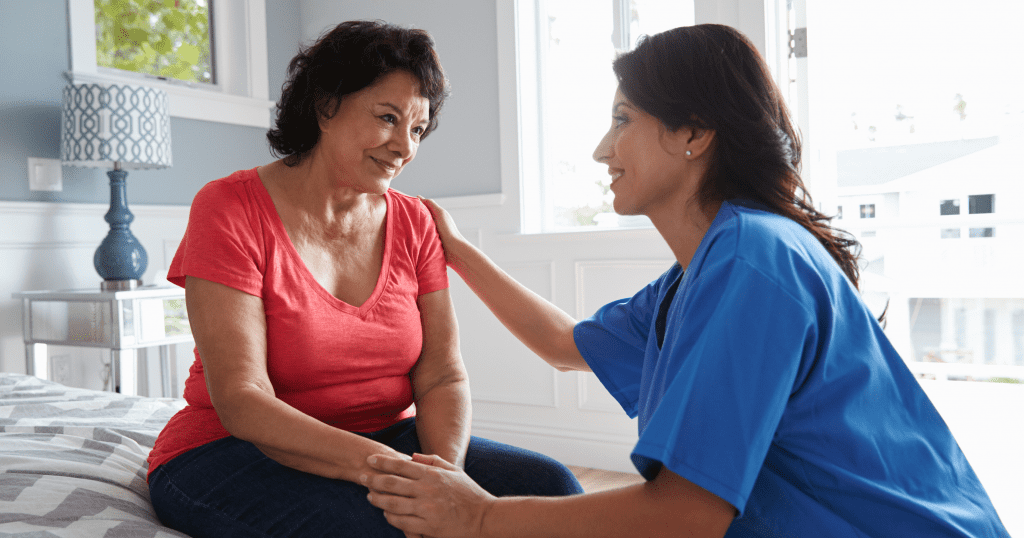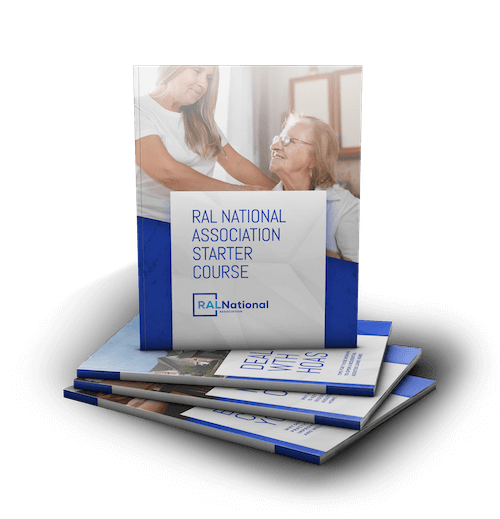[vc_row css_animation=”” row_type=”row” use_row_as_full_screen_section=”no” type=”full_width” angled_section=”no” text_align=”left” background_image_as_pattern=”without_pattern”][vc_column][vc_empty_space][vc_column_text]
Like Dementia, It Can Be Difficult To Deal With The Fact That COVID-19 Will Likely Affect Someone You Know, In Some Way Or Another.
[/vc_column_text][vc_empty_space height=”16px”][vc_column_text]However, caregivers of seniors suffering from dementia will be affected in a variety of different ways. What are added steps caregivers should be taking to protect seniors with dementia from COVID-19? This article aims to provide readers with some helpful tips for you and your staff to protect yourselves and your residents during these troubling times of the Coronavirus.[/vc_column_text][vc_empty_space height=”16px”][vc_column_text]Dementia does not increase risk for COVID-19. The illness is specifically a respiratory condition. However, dementia-related behaviors have the potential to increase risks. For example, people with Alzheimer’s disease and other dementia-related conditions may forget to wash their hands or take other precautions to prevent illness.[/vc_column_text][vc_empty_space height=”16px”][vc_column_text]
PRO-TIPS FOR CAREGIVERS OF SENIORS WITH DEMENTIA WHO LIVE AT HOME
[/vc_column_text][vc_empty_space height=”16px”][vc_column_text]Caregivers of individuals living with dementia should follow guidelines from the Centers for Disease Control (CDC), and consider the following tips:[/vc_column_text][vc_empty_space height=”16px”][vc_column_text]
- People living with dementia may need extra and/or written reminders and support to remember important hygienic practices from one day to the next.
-
- Consider placing signs in the bathroom and elsewhere to remind people with dementia to wash their hands with soap for 20 seconds.
- Use images to demonstrate thorough hand-washing techniques.
- Alcohol-based hand sanitizer with at least 60% alcohol can be a quick alternative to hand-washing for individuals who have mobility difficulties.
- Request that the doctor and pharmacist increase prescription amounts to reduce pharmacy trips.
- Make alternative plans for seniors who utilize adult day care, respite services in the event that schedules are modified or canceled due to the coronavirus.
- Consider alternative options for care management to be prepared in the event the primary caregiver becomes ill.
[/vc_column_text][vc_empty_space height=”16px”][vc_column_text]
PRO-TIPS FOR CAREGIVERS OF SENIORS WITH DEMENTIA IN ASSISTED LIVING
[/vc_column_text][vc_empty_space height=”16px”][vc_column_text]The CDC has provided guidance to facilities on infection control and prevention of COVID-19 in nursing homes. Precautions may vary based on the situation in your state. However, extra precautions should always be taken amongst seniors with dementia.[/vc_column_text][vc_empty_space height=”16px”][vc_column_text]
- Make sure that your residential assisted living home is following CDC procedures for managing COVID-19 risk.
- Ensure that your emergency contact information is accurate.
- Do not allow visitations of family members with signs or symptoms of illness, some states have stopped visitations all together.
- If visitation is not allowed, make sure that your RAL home provides ways that family members can stay in contact. Communication options can include telephone calls, video calls or even emails to check in.
- For seniors who are unable to engage in calls or video chats, be sure to have your staff prepared to provide routine updates when family members reach out to residents.
[/vc_column_text][vc_empty_space height=”16px”][vc_column_text]
WAYS TO STAY HEALTHY
[/vc_column_text][vc_empty_space height=”16px”][vc_column_text]Report any flu-like symptoms to a medical professional immediately. The CDC has detailed guidelines and instructions regarding COVID-19. Follow these basic tips to keep yourself and your loved ones healthy:[/vc_column_text][vc_empty_space height=”16px”][vc_column_text]
- Avoid close contact with people who are sick.
- Avoid touching your eyes, nose and mouth.
- Stay home when you are sick; work from home.
- Cover your cough or sneeze with a tissue, then throw the tissue in the trash.
- Clean and disinfect frequently touched objects and surfaces using a regular household cleaning spray or wipe.
- Wash your hands often with soap and water for at least 20 seconds, especially after going to the bathroom; before eating; and after blowing your nose, coughing or sneezing.
[/vc_column_text][vc_empty_space height=”16px”][vc_column_text]
RALNA COVID-19 ADVISORY
[/vc_column_text][vc_empty_space height=”16px”][vc_column_text]For additional information on caring for seniors during this difficult season of social isolation, read: ADDRESSING ANXIETY AND COMPULSIVE DISORDERS IN SENIORS. (https://ralna.org/2020/02/addressing-anxiety-and-compulsive-disorders-in-seniors/). The Residential Assisted Living National Association is here to provide accurate and timely information, resources and support for RAL owners and staff. [/vc_column_text][vc_empty_space height=”16px”][vc_column_text]Laws, rules, and orders currently are rapidly evolving during this COVID-19 pandemic. During these unprecedented times we encourage you to stay up to date with all the information and advice from organizations like the CDC and World Health Organization. We all need to be united and proactive to overcome this adversity that is in front of us. It may seem scary now, but this too shall pass.[/vc_column_text][vc_empty_space height=”16px”][vc_column_text]We know that we are in the right place at the right time in seeking to provide exceptional care for our nation’s seniors. We encourage you to cooperate with health officials and adopt the advice they suggest. We hope that this information finds you well and that you continue to protect yourself, your families, your residents, and the community around you.[/vc_column_text][vc_empty_space][vc_separator css_animation=”fadeIn” type=”normal” color=”#eaeaea”][vc_empty_space][vc_row_inner row_type=”row” type=”full_width” text_align=”left” css_animation=””][vc_column_inner width=”1/6″][/vc_column_inner][vc_column_inner width=”2/3″][vc_single_image image=”99″ img_size=”medium” alignment=”center” qode_css_animation=””][vc_empty_space height=”10px”][vc_column_text]
If you found the information on this article valuable, you’ll find enormous benefits by becoming a member of our community. Visit this page to become a RALNA Member.
[/vc_column_text][/vc_column_inner][vc_column_inner width=”1/6″][/vc_column_inner][/vc_row_inner][vc_empty_space][/vc_column][/vc_row]











